
Over the years, search engine optimization (SEO) has come a long way. It used to be all about rather underhand tactics like stuffing keywords into your content, playing tricks with redirects, and hidden links. But times have changed, especially thanks to Google. It has gotten pretty smart at sniffing out those black hat SEO tactics and has shifted its focus to rewarding quality content and relevant websites.
Now, we’ve so much data on our users, we can get super specific about who we target with our content. It’s all about providing useful info to the right people. And guess what? There are some nifty SEO tools out there that can help us do just that. In this article, we’ll check out some of the best SEO tools the pros are using in the industry.
Keyword research
Is keyword research essential?
Let’s chat about keyword research – it’s a pretty big deal in the world of SEO. This process helps you dig up some seriously useful insights about what people are searching for and how many are doing so. Plus, it’s a goldmine for discovering awesome content ideas and blog topics that’ll hit the sweet spot with your audience.
Google Keyword Planner
Keyword planner is like your keyword guru, giving you the lowdown on how often folks are searching for specific terms. The best part? It’s absolutely free. All you need is a Gmail account, and you’re good to go.
- Keyword research: You can add up to 10 terms at a time and watch the magic happen. The tool doesn’t just stop at your input; it’ll also suggest related terms with high search volumes that you might’ve missed. It’s like having a crystal ball for understanding your audience’s interests.
- Keyword insights: What’s more, you’ll get insights on the average cost per click (CPC) and the competition. CPC tells you how much you might need to pay when someone clicks on an ad leading to your site. As for competition, it’s all about figuring out how tough it is to land on Google’s first page for a particular keyword.
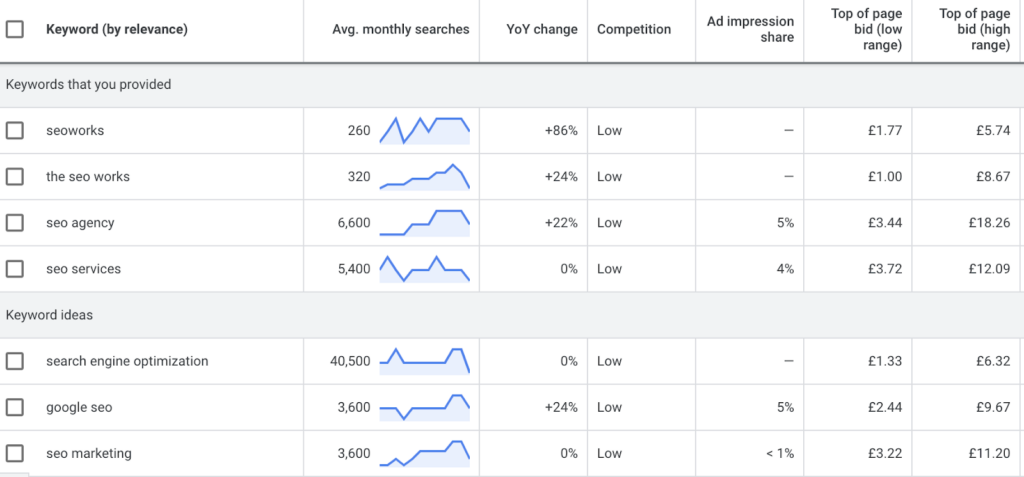
- Whole site suggestions: If you don’t know where to start, you can add in your domain to see keyword suggestions based on your whole website. Or, if you’re more into a specific page, simply drop in a URL – it’ll give you keyword suggestions tailored to that page.
- Competitor research: Here’s a cool tip: you can even use a competitor’s URL instead of your own. It’s like peeking over their shoulder to see what they’re ranking for. Great for competitor research and getting those brilliant content strategy ideas.
Chrome extension: Keyword Surfer
If you are a Chrome user, there is a nifty little tool called Keyword Surfer. This handy plug-in works its magic right in your Chrome browser, so you won’t need to jump through any hoops to access it.
- Right in the SERP: Picture this: you type in your search query, and like magic, Keyword Surfer displays basic stats right there on your main SERPs page. No need to visit a separate webpage or go through a login process. SEO stats at your fingertips.
- Extra information: Right next to your search box, you’ll find the keyword volume – it’s how popularity your search term is. And there’s also a table on the right that serves up a buffet of related keyword ideas, complete with their individual volumes. Another treasure trove of ideas for your next content adventure.
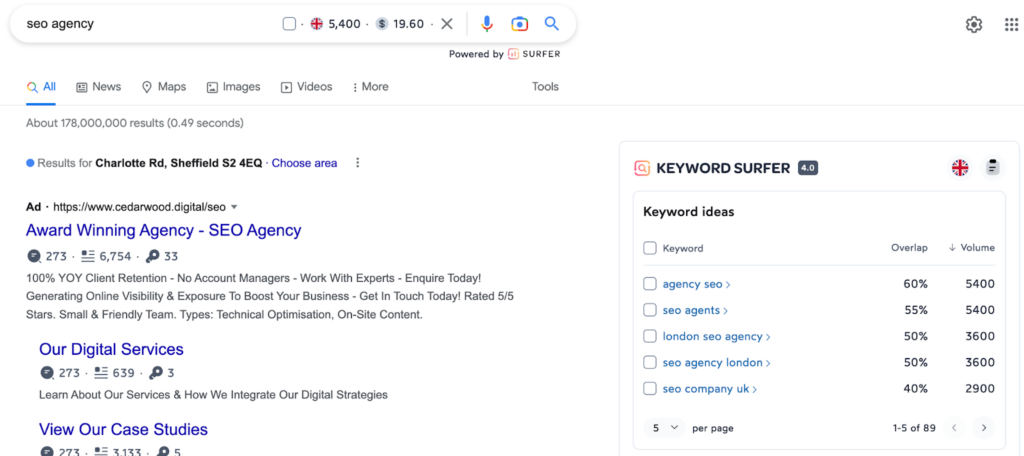
Ahrefs
Ahrefs, like your trusty keyword detective, serves up how often people are searching for specific terms. But it doesn’t stop there – it goes the extra mile. It also shows the competition level, marked as “keyword difficulty” (KD), which is a code telling you how tough it is to rank for that keyword.
- Global potential: But that’s not all – you also get to see the global volume (GV) and traffic potential (TP). Global volume tells you how popular a keyword is worldwide, and traffic potential is like a treasure map, showing you the keywords that can potentially drive heaps of visitors to your site.
- Topic insights: And here’s a neat trick: Ahrefs introduces you to the ‘parent topic.’ This is like the big boss keyword that covers a bunch of related terms. Say you’re curious about ‘Design agency’ – Ahrefs will spill the beans on related terms like ‘what to look for in a Design agency.’ These are your golden tickets to targeting keywords with less competition and crafting content that’s tailor-made for your audience.
- Extra features: You also get an ‘updated’ column that tells you the last time they checked the volume for a keyword. And when it comes to finding the right keywords, Ahrefs gives you the freedom to choose between ‘Term match’ or ‘Phrase match.’ It’s like saying, “I want keywords that contain the terms I gave you, in any order,” or “I want keywords that follow my terms exactly.” Flexibility is the name of the game.
SemRush
Now, let’s talk about SemRush. This powerhouse tool isn’t just a one-trick pony; it’s got a whole arsenal of SEO insights in its toolbox.
- Keyword Magic: As we’re talking about keyword research, and the Keyword Magic tool is where the real magic happens. Type in your term, and watch as SemRush unveils a vast array of related keywords. It’s like a keyword brainstorming session on steroids.
- Organisation: SemRush takes organization seriously. It groups these keywords into topical groups and subgroups. Topical groups are like the big themes – they tell search engines, “Hey, this is what I’m all about.” It’s like staking your claim to authority in a particular domain. Then there are the subgroups, where you’ll find long-tail keywords. These little gems are perfect for super-focused keyword research.
- Exclusions: If there are certain keywords you’re not interested in, you can exclude them. For instance, you can say, “No thanks” to ‘free’ or ‘best’ if they’re not what you’re targeting.
Moz Keyword Explorer
Next up is Moz Keyword Explorer, a top-notch SEO tool that comes in both free and premium plans. The Keyword Explorer feature is like your SEO crystal ball, and it does some seriously awesome things:
- Keyword Trends: You get the latest insight on keyword trends and can peek at what keywords your site and its competitors are dominating the search kingdom with.
- Monthly Volume: You’ll see which keywords are stealing the spotlight.
- Difficulty Level: Find out how tough it is to conquer a keyword with Moz’s difficulty score.
- Organic CTR: Ever wondered how many clicks you’ll get when you nab a top spot? Moz gives an idea with this stat.
- Priority: This is where the magic happens. Moz combines all that data to create a priority score, so you can laser-focus on the most important keywords.
- Relevance: Keywords are sorted by relevance, so you can quickly spot the gems that’ll make your content shine.
- Ranking Distribution: When you’re searching by URL, Moz shows you which keywords your site is ranking for.

KWFinder
KWFinder is your trusty sidekick, ready to explore keywords and domains with you. Whether you’re searching by keyword or domain, it’s got you covered. Let’s break down what it does:
- Keyword Search: When you’re on the hunt for keywords, KWFinder reveals the search volume and even serves up related questions. It’s like having a conversation with your search engine.
- Competitor Intel: It doesn’t stop at keywords; KWFinder also suggests potential competitors for you to check out.
- Domain Discovery: Now, if you’re curious about your site’s keyword rankings, search by domain, and KWFinder will list the keywords and where your site currently stands. It’s a map of your SEO territory.
- Trends and Stats: And to keep things fresh, KWFinder tracks search volume trends over the last 12 months, so you can see popularity over time.
That’s not all – KWFinder also hands you some cool extras, like estimated visits (EV), cost per click (CPC), PPC competition, and keyword difficulty (KD). And the best part? You can give it a whirl for free with an account or pick from various pricing plans that suit your needs.
UberSuggest
UberSuggest, the brainchild of Neil Patel, is a trusty sidekick for keyword and domain research:
- Keyword data: Whether you’re searching by keyword or domain, UberSuggest lets you choose the country you’re exploring. For keyword searches, it unveils a treasure trove of stats. You’ll see the search volume, the SEO difficulty (that’s like a scale for how tough it is to rank for that term), the paid difficulty (think of it as competition in paid search), and the cost per click (CPC).
- Historical data: You can embark on your SEO journey with a basic search – no account needed. But if you want to dive into the historical data, tracking trends over time, you can easily upgrade.
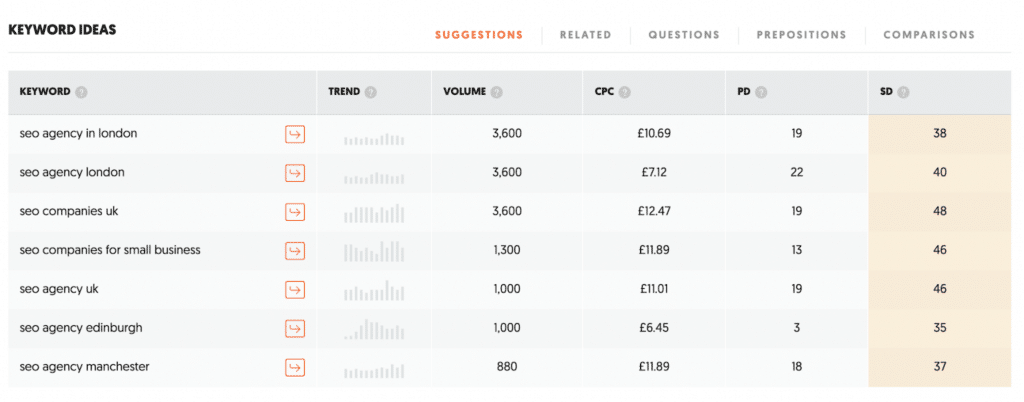
- Content Ideas: But that’s not all. UberSuggest is a goldmine of content ideas. It lays out a table of URLs that show up in the search results for specific keywords. You get the estimated traffic and a count of their backlinks – it’s like a peek behind the curtain at what your competitors are up to. Perfect for crafting your content strategy.
- Keyword lists: And here’s the best part: with an account, you can create keyword lists. It’s like having your own treasure chest to organize keywords into types, like informational or transactional. Keep your treasures sorted and your strategy on point.
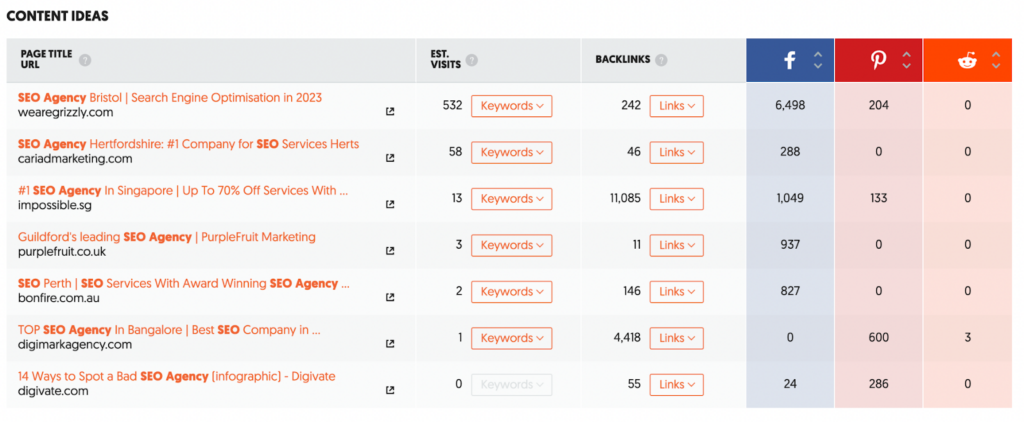
SEO Site Auditing
Are SEO site audits important?
Let’s talk website audits – these are like a health checkup for your site, making sure everything’s in tip-top shape. Website audits are your secret weapon for understanding where your website stands, how visible and user-friendly it is, and how you can improve your rankings to boost your online presence.
Screaming Frog
Screaming Frog is another trusty companion on your website audit journey. It crawls through your domain and sniffs out any issues that might be dragging down your SEO score. Broken links, redirect chains, metadata mishaps – you name it, Screaming Frog finds it. And the free version is awesome for small sites, letting you crawl up to 500 URLs.
If you’re going all-in, the paid version has unlimited URL crawls and comes with a bundle of extra features. It can hunt down near-duplicate content, scrutinize structured data, run spelling and grammar checks, and even buddy up with Google Analytics, Search Console, and Page Speed Insights. Oh, and it can generate sitemaps that you can upload via Google Search Console.
Sitebulb
Sitebulb is one of your trusty companions in this quest for perfection. It’s a tool that delves deep into your site’s performance. You start by setting up a project, enter your site’s domain, and let Sitebulb work its magic. It crawls through your site, audits it, and presents you with a plethora of reports. It’s like having your website’s personal detective.
Sitebulb dishes out these handy ‘hints.’ They’re like little insights into what’s going on. These hints come in various flavors, from ‘Pages with duplicate titles’ to ‘<h1> length too short.’ They’re all ordered by priority, creating a ready-made checklist that you can even export to Excel or Google Sheets.
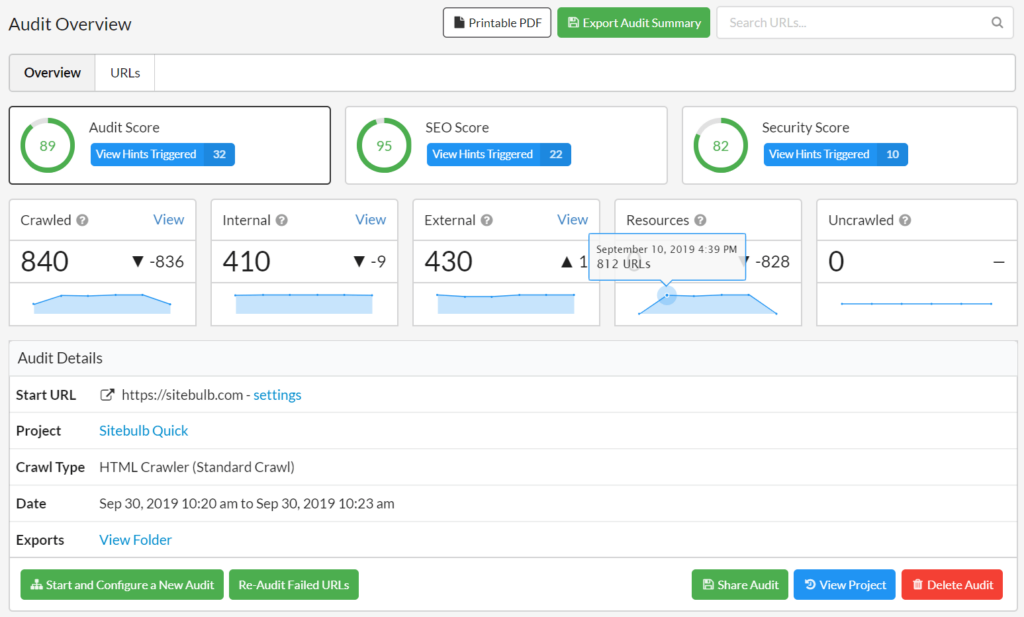
(from Sitebulb website)
But that’s not all – Sitebulb goes the extra mile. Each hint comes with an explanation, so you’ll know exactly what’s going on, why it’s important, and how to fix it. It’s like having a personal tutor guiding you through your site’s health check.
You can even download these findings as PDFs, making it super easy to share them with clients in a clear and presentable format. And one more cool trick up Sitebulb’s sleeve is the ability to compare previous audits, helping you keep an eye on your progress. The best part? You can give it a spin for free before deciding if it’s your perfect match.
Technical Issues
Can technical issues impact SEO?
Let’s unravel the world of technical issues – especially the ones that can affect your SEO. These nasties can impact your SEO score and where your site ranks in the grand scheme of things. We’re talking about:
- Mobile Usability: If your site doesn’t play nice with mobile devices, it’s a technical roadblock.
- Duplicate Content: Seeing double? Duplicate content can confuse search engines and hurt your SEO.
- Navigation Nightmares: Poor site navigation is like getting lost in a maze – frustrating for both users and search engines.
- Bulky Images: Large, uncompressed images slow things down and can make users click away.
- Page Load Speed: Slow websites are the bane of the digital world. Users want speed, and so do search engines.
- Structured Data Slip-Ups: Incorrect or missing structured data can affect how search engines understand your content.
- Wonky URLs: URLs with special characters or capital letters can cause confusion, best to keep it simple.
That’s why it’s vital to dig into the technical side of your site. Tools are your best friends in helping you uncover what’s wrong. Here are some trusted allies:
Google Search Console
Google Search Console is like the command center for your SEO efforts. It’s your go-to place for viewing how your site is performing in Google’s world. Once you’ve set up your account, you can dive into the metrics. You will be able to see things like:
- Total Clicks: How many people clicked onto your site from search results.
- Total Impressions: How many times your site showed up in search results.
- Average Click-Through Rate: How enticing your search results are.
- Average Position in the SERPs: Where you typically land in search results.
Plus, you can spot any pages with indexing issues, decide if they should be ‘noindexed,’ and even request Google to index them directly from the console. It’s like having the keys to the SEO kingdom.
Google Search Console doesn’t stop there. You can take a closer look at individual pages with the URL inspection feature, check out your top-performing pages, and explore the queries that bring traffic to your site. It’s like your SEO magnifying glass, helping you zoom in on the good stuff.
Page Speed Insights
Page Speed Insights gives you the lowdown on your site’s performance, especially when it comes to page speed. You’ll see how your site scores on both mobile and desktop, and whether you’ve aced the Core Web Vitals Assessment.
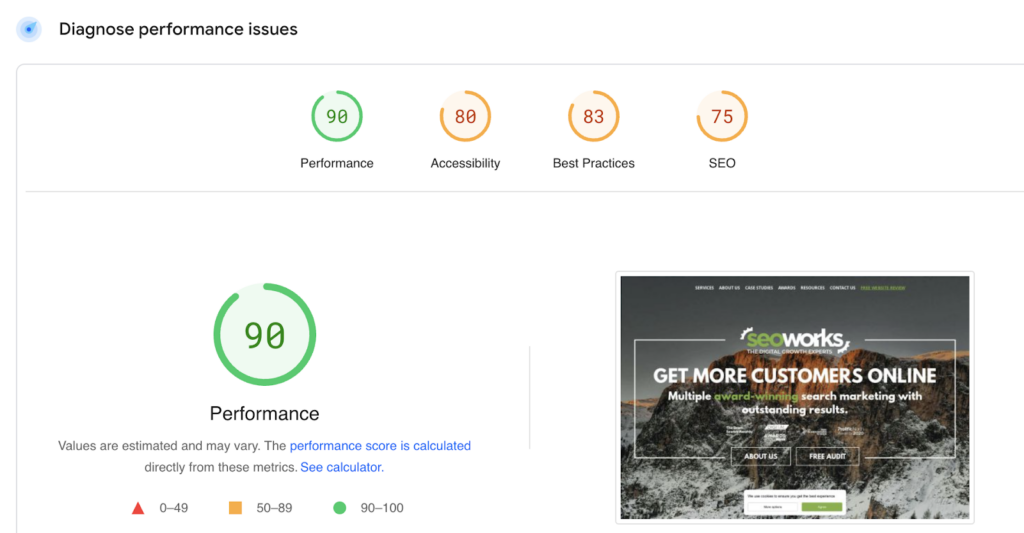
But that’s not all – Page Speed Insights takes it a step further. It generates a report that spills the beans on how you can rev up your performance score. From reducing unused CSS to optimizing image formats and trimming JavaScript, it’s like a mechanic giving your site a tune-up.
You’ll also get acquainted with metrics like Largest Contentful Paint, First Input Delay, and Cumulative Layout Shift. Giving you a checklist of things to fine-tune for a smoother, faster, and more efficient website.
Content Writing
Using tools to support content writing
Why should you bring in tools to bolster your blog and content writing efforts? It’s like having a team of experts in your corner. Remember, keyword research is the bread and butter of writing content that has the user in mind (yet also targets searches the user is making).
Choosing the right keywords that sync is the secret sauce to helping users discover the gems they’re after and rocketing your site up the ranks. But how do you uncover these magical keywords? This is where tools like the below come in handy.
Answer The Public
Answer The Public is your first trusty companion. It reveals popular search phrases and query ideas. You can search by topic, brand, or product in any country. And it doesn’t just stop at questions – it also throws in prepositions, comparisons, and related terms for good measure. With a free account, you get up to three searches a day. It’s like uncovering what people are actually thinking when they search!
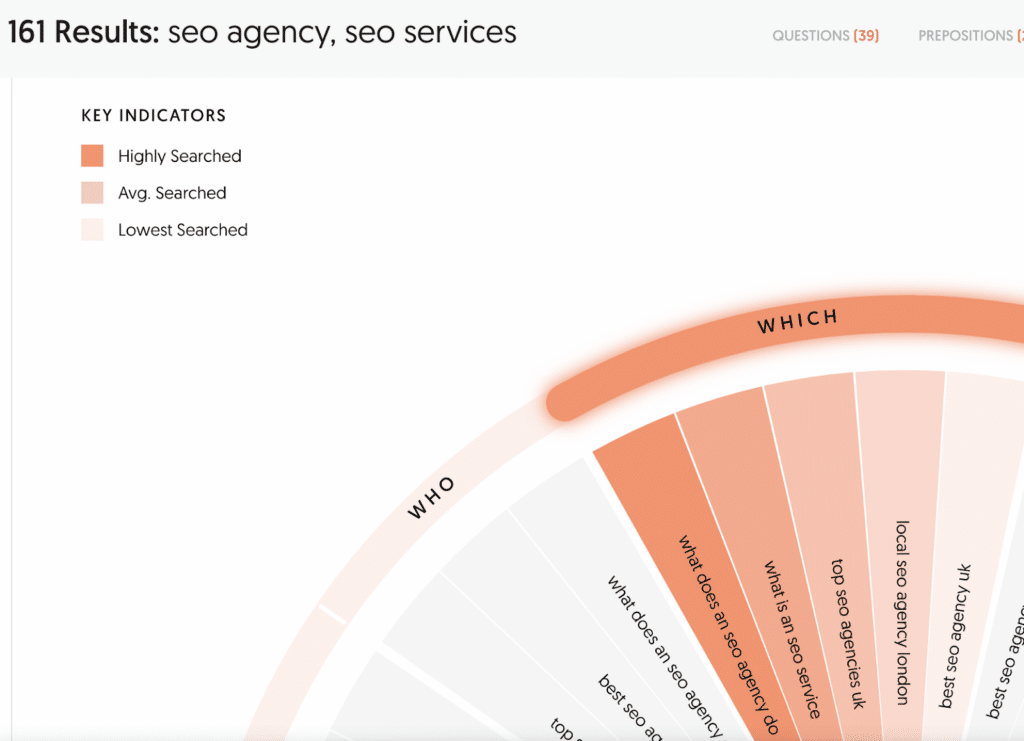
Frase.io
Frase.io is a tech wizard, using AI technology to assist you in writing and optimizing SEO content. You can choose from solo, basic, or team membership plans, depending on how often you plan to use it. Frase can also help you craft article briefs and generate content ideas. Pro tip: while Frase can be a fantastic guide, seasoned content writers shouldn’t let it take over. Let your own research and expert SEO knowledge shine.
Grammarly
Grammarly is your trusty writing assistant. It sniffs out grammar issues, zaps spelling errors, and even plays detective for plagiarism. But that’s not all – it can spot sentences that could use a little makeover for clarity. You can either write directly on the website platform or upload an existing document. And here’s a bonus – you can enlist Grammarly’s aid in Google Docs for real-time grammar and sentence structure suggestions. There’s a free account for the basics, or you can go premium for advanced formatting and tackling complex sentences.


Conclusion
These SEO tools are not just fancy gadgets; they’re your key to crafting captivating content, deciphering what’s on people’s minds, and spotting issues that might be stealthily sabotaging your SEO score and site performance.
SEO experts like us love these tools to streamline our tasks, but here’s the secret sauce – it’s our vast years of experience and deep-rooted expertise that truly fuel our successful campaigns. If you’re on the lookout for a top-tier SEO agency, get in touch to discover why industry leaders have crowned us as a top SEO Services provider.




